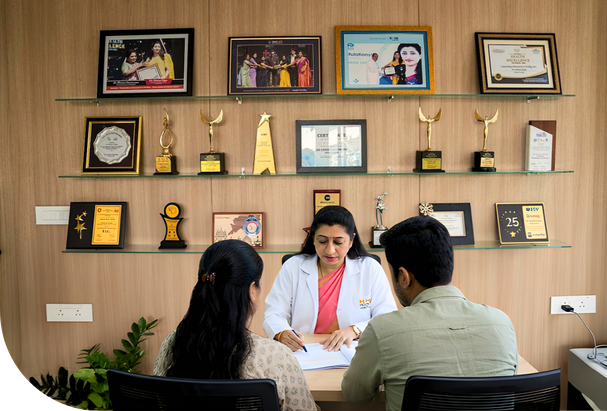HLA Typing (Matching) in IVF: Integrating Genetics and Immunology for a Successful Pregnancy

The evolution of assisted reproductive technology has significantly improved IVF success rates worldwide. Yet, for a subset of couples, repeated implantation failure or recurrent pregnancy loss continues despite good-quality embryos and optimal uterine conditions. These challenging situations often prompt fertility specialists to explore factors beyond conventional parameters. One such emerging and complex area is reproductive immunology, where HLA typing in IVF may offer valuable clinical insights.
At Hegde Fertility, fertility care is approached with precision, scientific integrity and individualized decision-making. HLA typing represents an advanced genetic and immunological evaluation that may be considered in carefully selected IVF cases, particularly where standard investigations do not fully explain adverse outcomes.
Understanding HLA and Its Role in Human Immunity
Human Leukocyte Antigens (HLA) are a group of genetically determined proteins located on the surface of most cells in the body. Their primary role is to help the immune system distinguish between the body’s own tissues and foreign material. This system is fundamental to immune regulation and plays a well-established role in organ transplantation, where tissue compatibility is essential.
In the context of pregnancy, HLA assumes a unique biological significance. An embryo carries genetic material from both parents and is therefore immunologically distinct from the mother. A successful pregnancy requires a delicate and highly regulated immune balance, where the maternal immune system adapts to support implantation and fetal development rather than mounting an adverse immune response.
Embryo HLA Testing (Embryo HLA Typing): Procedure, Reporting, and Clinical Uses
In certain highly selected IVF scenarios, embryo HLA testing (often discussed under the broader umbrella of PGT with HLA typing) may be considered to understand the HLA profile of embryos before transfer.
The procedure is integrated into a standard IVF cycle: ovarian stimulation and egg retrieval are followed by fertilization (IVF/ICSI), and embryos are grown in the lab to the blastocyst stage (Day 5/6). At this stage, an embryologist performs a trophectoderm biopsy (sampling a few cells from the outer layer that forms the placenta, not the fetal part), after which the embryo is typically vitrified (frozen) while genetic analysis is performed.
The reporting generally includes identification of the embryo’s HLA markers (and, where clinically indicated, may be combined with embryo genetic assessment such as aneuploidy screening or single-gene testing, depending on the case).
Clinical use is highly contextual: it may support decision-making in rare, specific indications—such as family-building plans where HLA status is clinically relevant—and it can also provide additional information in complex cases being evaluated under reproductive immunology frameworks.
Importantly, embryo HLA results are not interpreted as a “success predictor” on their own; they are reviewed alongside embryo development, uterine factors, past reproductive history, and the complete clinical picture to guide a careful, individualized plan.
HLA Typing in IVF: Clinical Relevance
In most pregnancies, natural immune adaptation occurs seamlessly. However, in certain couples, immune-related factors may contribute to repeated implantation failure or early pregnancy loss. In such complex and unexplained cases, HLA typing may be explored as part of a broader reproductive immunology assessment.
HLA typing in IVF does not function as a predictive or diagnostic tool on its own. Instead, it helps fertility specialists understand whether immune compatibility could be one of several contributing factors influencing embryo implantation or pregnancy continuation. Its role is contextual and supportive, rather than definitive.
It is important to emphasize that HLA typing is not a routine investigation in IVF. Its use is reserved for specific clinical scenarios and must always be interpreted alongside the patient’s medical history, embryo quality, uterine evaluation and other relevant investigations.
When Is HLA Typing Considered in IVF Treatment?
HLA typing may be discussed in IVF cases where couples experience repeated failures despite optimal treatment conditions. This includes situations where embryos of good morphological and genetic quality fail to implant, or where pregnancies repeatedly end in early loss without an identifiable anatomical or hormonal cause.
In donor embryo programs or surrogacy arrangements, HLA evaluation may occasionally be considered to support immune compatibility assessment when clinically justified. Even in these situations, the test is used selectively and only after thorough consultation with a fertility specialist.
At Hegde Fertility, such advanced investigations are never suggested in isolation or as routine add-ons. Each recommendation is guided by clinical evidence, ethical responsibility and patient-specific needs.

HOW THE HLA
TYPING TEST
IS PERFORMED?
HLA typing is conducted through a simple laboratory process using either blood samples or cheek swabs obtained from both partners. These samples undergo specialized genetic analysis to identify specific HLA markers.
The results are not interpreted in isolation. Instead, they are carefully reviewed by experienced fertility specialists in correlation with the couple’s IVF history, reproductive outcomes and overall clinical profile. Where necessary, treatment strategies are refined as part of a comprehensive, individualized fertility plan, rather than being driven by HLA results alone.
Cost of HLA Typing Test in India
The cost of HLA typing in India can vary based on the level of genetic analysis required, the laboratory techniques used and the clinical indications for testing. Since this is an advanced investigation, it is recommended only in carefully selected cases.
At Hegde Fertility, advanced genetic testing is recommended only when it adds meaningful clinical value. This ensures that patients are not subjected to unnecessary investigations and that every test contributes constructively to treatment planning.
A Thoughtful, Evidence-Based Approach at Hegde Fertility
Under the leadership of Dr. Vandana Hegde, Clinical Director & Chief IVF Consultant, Hegde Fertility follows a philosophy rooted in scientific rigor, transparency and patient-centered care. Advanced diagnostic tools such as HLA typing are integrated thoughtfully, always respecting the boundaries of evidence-based medicine.
Our approach recognizes that IVF success is influenced by multiple factors—including age, embryo competence, uterine receptivity, hormonal balance and overall health. Immunological assessments, when used, are part of a broader clinical framework, not a standalone solution.
The objective is not merely to achieve pregnancy, but to support a healthy, sustained pregnancy with long-term maternal and fetal well-being.

Every fertility journey is unique and so is every clinical decision. At Hegde Fertility, advanced investigations like HLA typing are used judiciously, ethically and only when clinically appropriate—guided by expertise, compassion and an unwavering commitment to medical integrity.
Frequently Asked Questions
What is HLA and why does it matter in pregnancy?
HLA is a set of special proteins on our cells that help the body’s defense system know what is “self” and what is “foreign.” In pregnancy, the baby has genes from both mother and father, so it is naturally a little “foreign” to the mother’s body. For a healthy pregnancy, the mother’s immune system has to accept the baby and support it instead of fighting it.
Why do some couples need HLA testing in IVF?
HLA testing is usually done in very specific, difficult cases—for example:
➤ Repeated IVF failures despite good-quality embryos
➤ Repeated early miscarriages
➤ All routine tests (hormones, uterus scans, sperm tests, basic genetics) are normal, but problems still continue
➤ There is a strong medical reason to look at immune and genetic factors more deeply
In such situations, doctors may check if the immune system and HLA patterns could be one of the factors.
What is embryo HLA testing?
Embryo HLA testing means checking the HLA pattern of the embryo before it is transferred into the uterus. It is usually done as part of an IVF cycle where embryos are grown to the Day 5/6 (blastocyst) stage. A few cells are gently taken from the part that will form the placenta (not the part that becomes the baby) and sent to a lab for detailed testing. The embryo is then frozen while we wait for the results.
Does embryo HLA testing hurt the embryos?
The biopsy is done very carefully by trained embryologists and is a standard method used worldwide when genetic testing is needed. Only a few cells from the outer layer (which forms the placenta) are taken, and the main part that becomes the baby is not touched. While no procedure is completely risk-free, this method is considered safe and widely used in advanced IVF labs.
Will HLA testing tell me if my IVF will succeed?
No, HLA testing alone cannot predict success or failure on its own. It only gives extra information about the immune and genetic pattern of the embryo. Doctors always look at HLA results together with:
➤ Embryo quality
➤ Uterine health
➤ Hormone levels
➤ Previous IVF and pregnancy history
➤ Other test results
How can HLA testing help in patient's treatment?
In selected cases, HLA testing will:
➤ Help doctors understand if immune factors could be playing a role
➤ Guide which embryos to transfer in very special situations (for example, when HLA status is important for a family’s medical needs)
➤ Add extra insight in complex cases where usual tests are normal but outcomes are still poor
➤ It helps in fine-tuning the plan, not in making promises.
If a patient embryos are good and uterus scan is normal, is HLA still relevant?
Sometimes, even when embryos look good and the uterus appears normal, pregnancies do not continue. In a small number of such unexplained cases, the immune system and HLA patterns might be one of several possible reasons. That is when your doctor may discuss advanced options like HLA typing to see if it adds any useful information.
Why doesn’t every clinic offer or suggest HLA testing?
Advanced & very Specialized…
Centers like HEGDE FERTILITY use it carefully, only when the clinical situation truly justifies it, to avoid unnecessary tests and confusion for patients.
What is Hegde Fertility’s approach to HLA testing?
At HEGDE FERTILITY:
➤ Treatment is individualized, not “one-size-fits-all.”
➤ HLA typing is used only in specific, complex cases where usual tests have not explained the problem.
➤ The focus is on scientific integrity—using advanced tests only when they add real value and making decisions based on patient’s complete clinical picture, not on a single report.
